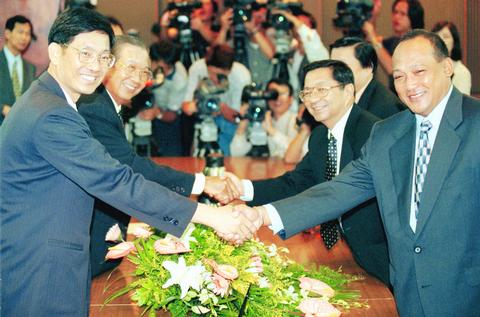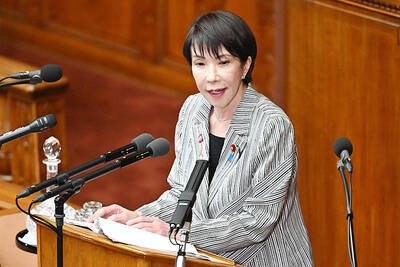Taiwan and the Philippines signed a new aviation agreement yesterday, ending a yearlong aviation row that cut air links between the two countries and disrupted investment, tourism and the importation of labor to Taiwan.
The new agreement effectively gives Taiwanese airlines more than 10,000 passenger seats a week, including chartered flights to the Philippines, and the right to transport people and cargo from Manila to third countries via Taipei.
The Philippines had accused Taiwan of poaching passengers and demanded that Taiwanese carriers China Airlines (

PHOTO: CHUANG CHUNG-LUNG, TAIPEI TIMES
Flights were resumed in February but were cut again March 15, after each side accused the other of reneging on agreements. The air dispute has soured relations between the two historically friendly neighbors.
By unilaterally canceling the air pact, Manila ignored international procedures that call for a one-year warning before an air agreement is terminated, Taiwanese officials said.
But yesterday, Philippine officials appeared to have caved in to Taiwanese demands because of the mounting economic toll the severed air links had on their country.
"If our Philippine counterpart breaks the agreement again, the bilateral air links will be permanently terminated," said Chang You-hern (
"We have written down the details in the new agreement that leaves no room for misinterpretation," said Rodolfo Reyes, representative of the Manila Economic and Cultural Office, Philippines' unofficial embassy in Taiwan.
Chang said the most contentious issue was Taiwan's right to take passengers to third countries, known in the aviation industry as ``sixth freedom rights.''
"This was a very important aspect. Now sixth freedom rights are clearly stipulated in the new agreement,'' Chang said after the signing ceremony.
Under the new deal, the carriers of both countries will each be allowed to fly 4,800 passengers weekly between Taipei and Manila, and 1,700 passengers between Taiwan's southern port city of Kaohsiung and Manila.
Both sides will also be allowed to fly 450 passengers from Taipei to any other point in the Philippines apart from Cebu and Manila, and 3,100 seats are allowed for several local airlines to provide chartered flights services to Philippines cities excluding Manila.
"We will have meetings with the airlines soon to discuss how the number of flight seats will be allocated to each respective airlines," Chang Kuo-cheng (
The pact also increases cargo volume to 360 tonnes from 270 tonnes a week, according to the new deal.
Philippine President Joseph Estrada reportedly said on Monday that he ordered Reyes to sign the new agreement, even if it meant financial losses for debt-ridden Philippine Airlines (PAL).
In Manila, PAL President Avelino Zapanta acknowledged the airline will be forced "to improve services some more" to compete with Taiwanese carriers. He said that PAL, Asia's oldest airline, would stand to lose about US$800 million annually because of the deal.
"We could lose the national carrier. That's when people will start waking up," Zapanta said yesterday.
"We expect to resume flights in mid October at the earliest," said Cindy Lin from Philippine Airlines' Taipei branch office.
Officials at China Airlines said that the specific timing of when flights would be resumed is still under study because the airline needs extra time to reschedule flights.
The air row has proven costly for the Philippines, where first-quarter Taiwanese investment has dropped 72 percent to US$390,000, compared to the same time last year, according to the Ministry of Economic Affairs.
Additionally, Reyes indicated that tourism from the Philippines to Taiwan had dropped 75 percent since the suspension of air links last October.

The Central Weather Administration (CWA) yesterday said it expected to issue a sea warning for Typhoon Fung-Wong tomorrow, which it said would possibly make landfall near central Taiwan. As of 2am yesterday, Fung-Wong was about 1,760km southeast of Oluanpi (鵝鑾鼻), Taiwan’s southernmost point, moving west-northwest at 26kph. It is forecast to reach Luzon in the northern Philippines by tomorrow, the CWA said. After entering the South China Sea, Typhoon Fung-Wong is likely to turn northward toward Taiwan, CWA forecaster Chang Chun-yao (張峻堯) said, adding that it would likely make landfall near central Taiwan. The CWA expects to issue a land

Taiwan’s exports soared to an all-time high of US$61.8 billion last month, surging 49.7 percent from a year earlier, as the global frenzy for artificial intelligence (AI) applications and new consumer electronics powered shipments of high-tech goods, the Ministry of Finance said yesterday. It was the first time exports had exceeded the US$60 billion mark, fueled by the global boom in AI development that has significantly boosted Taiwanese companies across the international supply chain, Department of Statistics Director-General Beatrice Tsai (蔡美娜) told a media briefing. “There is a consensus among major AI players that the upcycle is still in its early stage,”

The Central Weather Administration (CWA) yesterday said it is expected to issue a sea warning for Typhoon Fung-wong this afternoon and a land warning tomorrow. As of 1pm, the storm was about 1,070km southeast of Oluanpi (鵝鑾鼻), Taiwan’s southernmost point, and was moving west-northwest at 28 to 32kph, according to CWA data. The storm had a radius of 250km, with maximum sustained winds of 173kph and gusts reaching 209kph, the CWA added. The storm is forecast to pass near Luzon in the Philippines before entering the South China Sea and potentially turning northward toward Taiwan, the CWA said. CWA forecaster Chang Chun-yao (張峻堯) said

Japanese Prime Minister Sanae Takaichi yesterday said that China using armed force against Taiwan could constitute a "survival-threatening situation" for Japan, allowing the country to mobilize the Japanese armed forces under its security laws. Takaichi made the remarks during a parliamentary session while responding to a question about whether a "Taiwan contingency" involving a Chinese naval blockade would qualify as a "survival-threatening situation" for Japan, according to a report by Japan’s Asahi Shimbun. "If warships are used and other armed actions are involved, I believe this could constitute a survival-threatening situation," Takaichi was quoted as saying in the report. Under Japan’s security legislation,